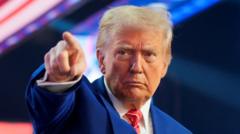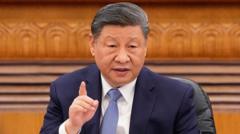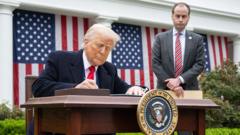Trump's comments at a conservative conference underline potential shifts in U.S. foreign policy as Panama's president firmly defends their sovereignty.
Trump Calls for Panama Canal Fee Reductions or Return to U.S. Control

Trump Calls for Panama Canal Fee Reductions or Return to U.S. Control
In a bold address, President-elect Trump demands lower fees from Panama for the Canal, threatening to reclaim control if demands aren't met.
The former president made headlines during a recent speech at Turning Point's annual conference, asserting that Panama's fees for the Panama Canal were excessively high. He insisted that if immediate reductions weren't implemented, he would seek the canal's complete return to U.S. control. His statements ignited a swift response from Panamanian President José Raúl Mulino, who reaffirmed that the canal and its surrounding lands were inherently the property of Panama, stressing the unyielding nature of their sovereignty and independence. Trump's comments raise concerns about the direction of U.S. diplomacy and foreign relations, particularly in light of his approach to trade practices with both Canada and Mexico, which he also criticized during his speech.
The Panama Canal, completed in the early 20th century, serves as a crucial passageway between the Atlantic and Pacific oceans, facilitating approximately 14,000 ship crossings annually. Trump's demand comes on the heels of his assertion that the canal represents a "vital national asset" for the United States. While some regard Trump's stance as a rallying point for his supporters, others fear it may signal a tumultuous transition in America's international diplomatic relations.
Speaking to a large gathering of conservative activists, Trump touched upon familiar themes of his campaign, including immigration and crime but notably sidestepped recent debates over government spending and the national debt ceiling. As he gears up for taking office, it remains uncertain how these bold claims regarding the Panama Canal and trade will resonate on the global stage.
The Panama Canal, completed in the early 20th century, serves as a crucial passageway between the Atlantic and Pacific oceans, facilitating approximately 14,000 ship crossings annually. Trump's demand comes on the heels of his assertion that the canal represents a "vital national asset" for the United States. While some regard Trump's stance as a rallying point for his supporters, others fear it may signal a tumultuous transition in America's international diplomatic relations.
Speaking to a large gathering of conservative activists, Trump touched upon familiar themes of his campaign, including immigration and crime but notably sidestepped recent debates over government spending and the national debt ceiling. As he gears up for taking office, it remains uncertain how these bold claims regarding the Panama Canal and trade will resonate on the global stage.





















